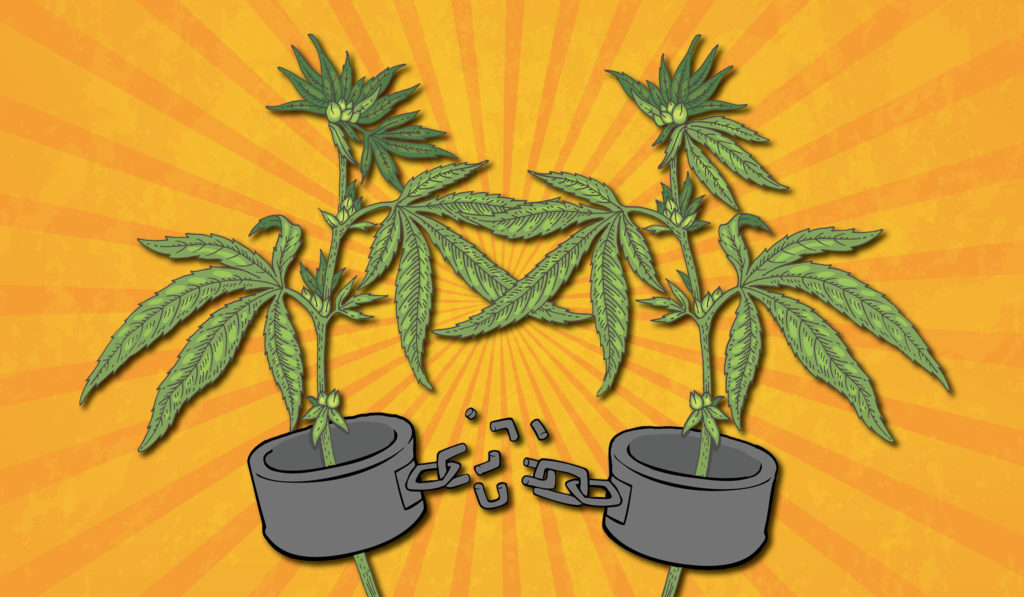Last week, in response to the ongoing uprisings against police violence, Democrats in Congress introduced The Justice In Policing Act. The police reform legislation intends to end racial profiling by police, bans chokeholds and no-knock warrants, reduces police use of military equipment, and pushes for greater transparency among police departments making it easier for more police officers to be prosecuted for abuses and crimes. A fact sheet released by Congress detailing The Justice In Policing Act can be found here.
During a House Judiciary Committee markup for The Justice In Policing Act, Democratic Representative from California Lou Correa took some time to mention how changing federal cannabis laws would remedy some of the racial injustices in the country, and Correa added, reduce drug enforcement—one of the many duties given to police that is unnecessary.
“One of the issues I’d like to take note is our national drug policy right now: federal cannabis policy, essentially outlawing cannabis,” Correa said. “When we talk about arrest disparities, specifically cannabis-related, over 650,000 Americans are arrested every year for violating cannabis laws. And according to the ACLU in every single state black folks are more likely to be arrested for cannabis possession [than white folks].”
Correa is referring to the American Civil Liberties Union’s study from earlier this year, “A Tale of Two Countries: Racially Targeted Arrests in the Era of Marijuana Reform.” The study showed that on average a black person is 3.6 times more likely to be arrested for cannabis than a white person. Correa noted that cannabis reform would be a small but significant part in showing an understanding of the frustration fueling protests across the country: “Although cannabis reform in terms of its criminalization will not undue the practices that led to these demonstrations that we’re seeing today, decriminalizing cannabis will be a major step in the right direction,” he said.
There is a debate going on now about whether it is possible to reform police. More and more organizers and activists pushing against reform and instead demanding police either be drastically defunded or even abolished and replaced with community-facing groups and organizations who can do much of the work of police (as the New York Times recently showed, police spend a very small percentage of their time responding to violent crime). I recently weighed in on the problems of police reform in a Washington Post op-ed citing Baltimore, a forever-embattled city with a profoundly corrupt police department that has been in the process of “reform” for half-a-decade now and still endures scandals. Additionally, a 2018 investigative report (I was one of its cowriters) revealed that 96% of the people arrested in Baltimore for misdemeanor cannabis possession charges were black. It reflects what the 2016 Department of Justice Report into the Baltimore Police Department revealed on a larger level—that racial bias is rampant among Baltimore police. In short, cannabis reform and police reform are inextricably tied.
The National Organization for the Reform of Marijuana Laws (NORML) also commented on The Justice In Police Act and how it relates to cannabis. In a blog post titled, “Ending Cannabis Criminalization Is Police Reform,” written by NORML’s political director Justin Strekal, The Justice in Policing Act was praised for its “steps in a positive direction.” But Strekal added that central to police reform must be ending the war on drugs: “One of the most common pretexts provided by police for interacting with citizens is that they suspect that someone has either used or is in possession of marijuana,” Strekal wrote.
Strekal continued, mentioning The Marijuana Opportunity, Reinvestment, and Expungement Act (MORE), which passed the Judiciary Committee last year.
“It is clear that marijuana prohibition was largely born out of prejudice and racial animus and its enforcement continues to disproportionately impact people of color,” Strekal wrote. “While marijuana policy reform alone will not undo all of the most egregious practices that have led to the recent public outcry of Black Lives Matter and others, ending cannabis prohibition will help to improve the situation by limiting law enforcement’s power to stop and arrest over half a million citizens annually for possessing a substance that never should have been made illegal in the first place.”
Image by Kathy Wyche

